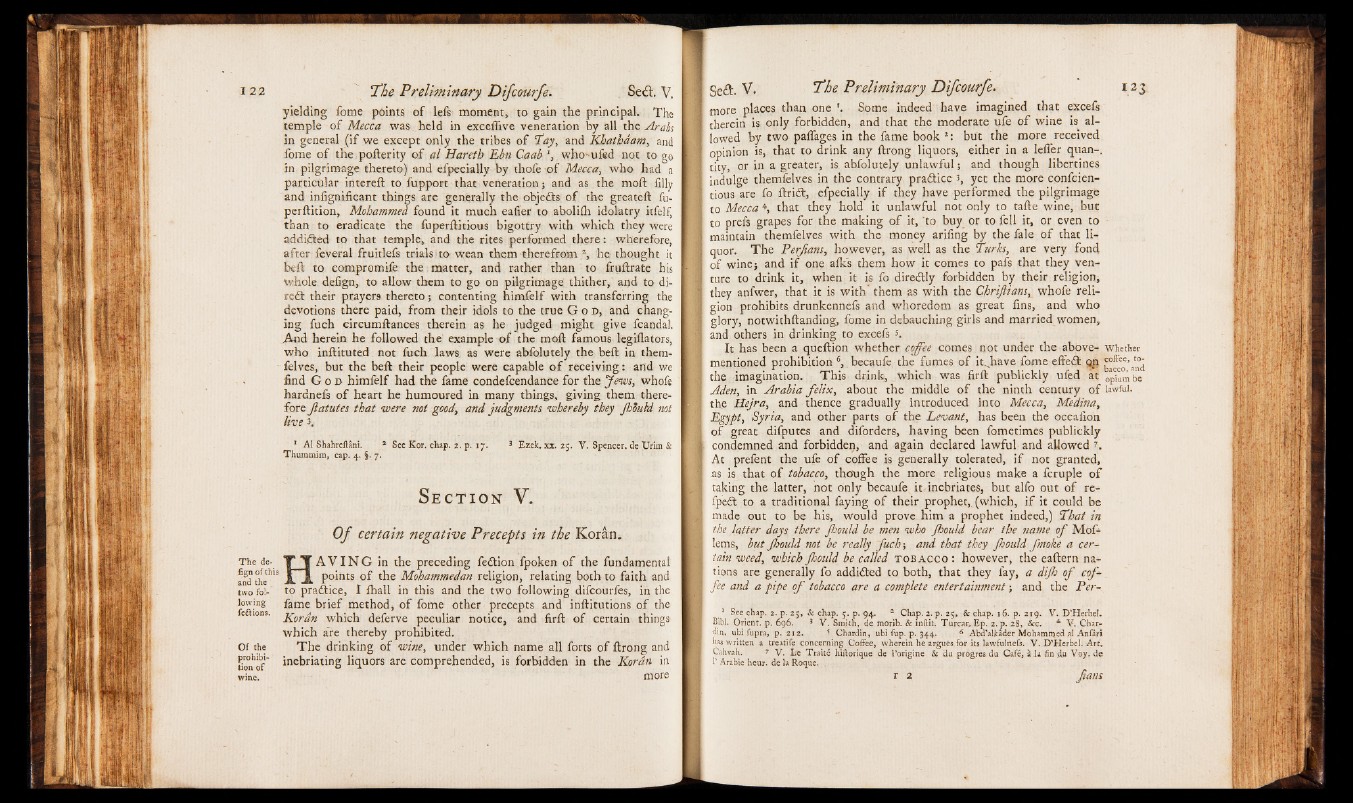
The de-
lign of this
and the
two following
feftions.
O f the
prohibition
of
wine.
yielding fome points of lefs moment, to gain the principal. The
temple of Mecca was held in exceflive veneration by all the Arabs
in general (if we except only the tribes of Tay, and Kbathdam, and
fome of the pofterity of al Hareth Ebn Caab who- ufed not to go
in pilgrimage thereto) and efpecially by thofe -of Mecca, who had a
particular intereft to fupport that veneration; and as the moft filly
and infignificant things are generally the objects of the greateft fu-
perftition, Mohammed found it much eafier to abolilh idolatry itfelf,
than to eradicate the fuperftitious bigottry with which they were
addicted to that temple, and the rites performed there: wherefore,
after feveral fruitlefs trials to wean them-therefrom 2, he thought it
beft to compromife the matter, and rather than to fruftrate his
whole defign, to allow them to go on pilgrimage thither, and to di-
red! their prayers thereto; contenting himfelf with transferring the
devotions there paid, from their idols to the true G od, and changing
fuch circumftances therein as he judged might give fcandal.
And herein he followed the example of the moft famous legiilators,
who inftituted not fuch laws as were abfolutely the beft in them-
felves, but the beft their people were capable o f receiving: and we
find G o d himfelf had the fame condefcendance for the Jews, whof«
hardnefs of heart he humoured in many things, giving them therefore
Jiatutes that were not good, and judgments whereby they Jhould not
live 3.
1 Al Shahreftani. * See Kor. chap. z. p. 17. 3 Ezek*xx. 25. V. Spencer.de Urim &
Thummim, cap. 4. §. 7.
S e c t i o n V .
O f certain negative Precepts in the Koran.
HA V IN G in the preceding fedtion fpoken of the fundamental
points of the Mohammedan religion, relating both to faith and
to pradtice, I fhall in this and the two following difcourfes, in the
fame brief method, of fome other precepts and inftitutions of the
Koran which deferve peculiar notice, and firft of certain things
which are thereby prohibited.
The drinking of wine, under which name all forts of ftrong and
inebriating liquors are comprehended, is forbidden in the Koran in
more
more places than one Some indeed have imagined that excefs
therein is only forbidden, and that the moderate ufe o f wine is allowed
by two paffages in the fame book but the more received
opinion is, that to drink any ftrong liquors, either in a lefier quantity,
or in a greater, is abfolutely unlawful ; and though libertines
indulge themfelves in the contrary practice s, yet the more confcien-
tious are fo ftridl, efpecially if they have performed the pilgrimage
to Mecca +, that they hold it unlawful not only to tafte wine, but
to prefs grapes for the making of it, 'to buy or to fell it, or even to
maintain themfelves with the money arifing by the fale of that liquor.
The Perjians, however, as well as the Turks, are very fond
of wine; and if one afks them how it comes to pafs that they venture
to drink it, when it is fo diredtly forbidden by their religion;
they anfwer, that it is with them as with the Chrijlianswhofe religion
prohibits drunkennefs and whoredom as great fins, and who
glory, notwithftanding, fome in debauching girls and married women,
and others in drinking to excefs s.
It has been a queftion whether coffee comes not under the above- whether
mentioned prohibition 6, becaufe the fumes of it^have fome effedt on
the imagination. This drink, which was firft publickly ufed at opiumbe
Aden, in Arabia fe lix , about the middle of the ninth century of lawful,
the Ilejra, and thence gradually introduced into Mecca, Medina,
Egypt, Syria, and other parts o f the Levant, has been the occafion
of great difputes and diforders, having been fometimes publickly
condemned and forbidden, and again declared lawful and allowed 8.
At prefent the ufe o f coffee is generally tolerated, i f not granted,
as is that of tobacco, though the more religious make a fcruple of
taking the latter, not only becaufe it inebriates, but alfo out of re-
fpedt to a traditional faying of their prophet, (which, i f it could be
made out to be his, would prove him a prophet indeed,) That in
the latter days there Jhould be men who Jhould bear the tiame o f Mof-
lems, but Jhould not be really fuch-, and that they Jhould fmoke a certain
weed, which Jhould be called to b a c co : however, the eaftern nations
are generally fo addicted to both, that they fay, a dijh of coffee
and a pipe o f tobacco are a complete entertainment ; and the Per-
1 See chap. 2. p. 25, & chap. 5. p. 94. 2 Chap. 2.p. 25, & chap. 16. p. 219. V. D’Herbel.
Bib). Orient, p. 696. 3 V. Smith, de morib..& inftit. Turcar„Ep. 2. p. 28, &c. * V. Chardin,
ubi fupra, p. 212. s Chardin, ubi fup. p. 344. 6 Abd’alkâder Mohamirçed al Anfâri
has written a treatife concerning Coffee, wherein hé argues for its lawfulnefs. V. D’Herbel. Art.
Cahvah. 7 V. h t Traité hiftorique de l’origine & du progrès du Café, à Ja fin du Voy. de
1’ Arabie heur, de la Roque.
r 2 jiam